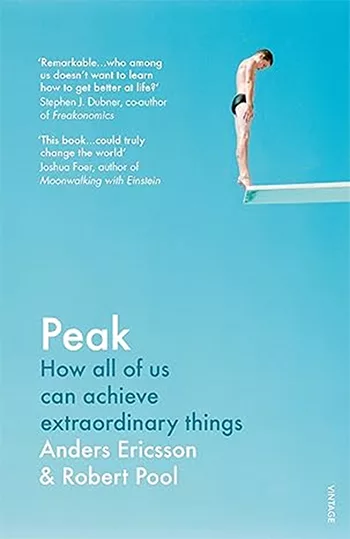There’s a lot of motivational fluff out there about becoming the best in the world but the problem is that most of it is completely detached from reality.
That’s why today we want to have an honest discussion about this subject. We are going to share some harsh truths but we believe that sugarcoating them would be a disservice to our readers!
- Be Honest With Yourself: Do You Have What it Takes to Become the Best in the World at What You Do?
- What is the Price of Becoming the Best in the World at What You Do?
- Evidence-Based Approach to Becoming the Best in the World at What You Do
- Do You Really Need 10,000 Hours of Practice to Become the Best in the World at What You Do?
- Can You Implement These Lessons in the Business Context?
- The Most Important Business Skill That You Need to Learn…
Be Honest With Yourself: Do You Have What it Takes to Become the Best in the World at What You Do?
You need to be realistic about whether you even stand a chance at reaching the top of your field to begin with.
We would argue that there are five key factors that determine that:
Your Age (Sorry!)
Everyone is aware of the fact that age matters in sports due to the inevitable age-related physical decline.
But it’s less known that age also matters in intellectual, academic, and creative pursuits due to the inevitable age-related cognitive decline.
It appears that people at the top of their fields tend to do their best work somewhere between their mid-20s and their late 30s.
Consider that they typically start developing their abilities in childhood or adolescence.
This means that the time period between 25 and 40 presents a perfect window of opportunity where they already have a high level of skill but their cognitive decline isn’t that noticeable yet.
And don’t be misguided by the fact that the average age of Nobel prize laureates in sciences has been steadily increasing since the 1950s.
They are still making their most important contributions relatively early in life. It simply takes longer for them to be acknowledged for it.
Unfortunately, if you are just starting out in an intellectual, academic, or creative field and you are already way past your cognitive prime (early 20s for most people), realistically speaking you probably won’t reach the top.

“Necessary But Not Sufficient” Prerequisites
Every field has the “necessary but not sufficient” prerequisites for success that tend to be largely determined by genetics.
- In sports, you need to have the right body type, metabolism, and athletic abilities.
- In academic fields, you need to have a certain level of intelligence as measured by the metric of IQ. You probably also need the right IQ tilt (verbal or spatial).
- In creative fields, the prerequisites are often less clear, but creativity itself is an obvious one.
Unfortunately, if you don’t have the prerequisites for success in your field, reaching the top of it is extremely unlikely.
Natural Aptitude for Relevant Skills
Those who reach the top of their fields tend to exhibit a natural aptitude for relevant skills early in life, often to the point of being recognized as child prodigies.
Here are some examples:
- UFC lightweight champion Khabib Nurmagomedov who successfully defended his title three times and retired undefeated with a record of 29-0 started training wrestling in childhood. There’s a viral video of him wrestling a bear at age 9.
- Magnus Carlsen, the top-ranked chess player of all time and a five-time chess world champion, played at his first chess tournament at age 8, was awarded a grandmaster (GM) title at age 13, and won the world championship for the first time at age 23.
- Mathematician Terrence Tao, who won the Fields medal in 2006 (the mathematics equivalent of the Nobel prize), started attending university-level math courses at the age of 9, received bachelor’s and master’s degrees at age 16, got his PhD at age 21, joined the faculty of UCLA at age 23 and became a full professor at age 24.
Keep in mind that if you want to reach the top of your field, you will be competing against people like this!

Personality That is Conducive to Getting to the Top of Your Field
The exact personality traits that are advantageous vary from field to field but there seem to be some commonalities among those who become the best in the world at what they do.
They tend to be extremely ambitious, determined to get to the top no matter what, and fiercely competitive.
They also tend to have obsessive tendencies that make them fixate on various aspects of what they do to an unusual degree.
E.g., they might find themselves unable to fall asleep because they can’t stop thinking about some obscure wrist lock, math problem, or chess endgame.
Finally, it appears that grandiosity often plays a role in their ascent, though it can lead to their downfall as well.
Financial Means to Get to the Top of Your Field
While it’s true that financial deprivation can fuel ambition, that is more relevant in the fields that have a relatively low barrier of entry in terms of money required to get started and relatively low ongoing costs required to develop a high level of skill.
We recommend researching how much money you would need to enter your field, develop a high level of skill and focus on this career path full-time so that you could have a realistic shot at becoming the best in the world at what you do.
Learn how people in your field make ends meet and take a closer look at the socioeconomic backgrounds and career trajectories of those at the top.
Don’t forget to keep an eye out for “mystery money” that people often fail to mention in their come-up stories.
Typically, mystery money is either coming from their parents, their breadwinning spouse, or their own success in an unrelated field (e.g. they sold a startup and are now writing science-fiction novels full-time).
You can detect its presence by people being able to afford something that they wouldn’t be able to afford otherwise, such as unpaid or low-paid internships in expensive cities like New York without having a job on top of that internship to pay the bills.
Access to mystery money can also manifest in less glamorous ways such as moving back in with their parents and living with them rent-free while working on their startup, their first novel, or their poker career.
It’s important to have a realistic understanding of the financial aspects of getting to the top of your field, especially when it comes to the expenses that may be less obvious, such as the aforementioned unpaid or low-paid internships.
What is the Price of Becoming the Best in the World at What You Do?
The Game Theory of Getting to the Top
Here’s a general principle that you should keep in mind when it comes to competition:
All else being equal, the person who is willing to sacrifice the most is going to win.
The game theory concept of a Moloch trap can be helpful when evaluating the cost of getting to the top.
Here’s how Liv Boeree, World Series of Poker (WSOP) and European Poker Tour (EPT) champion who is now one of the most prominent thinkers on Moloch traps, explains it:
This is the hidden force behind weight cutting and steroid abuse in sports, students at elite schools taking copious amounts of stimulants, and academics putting up with ridiculous work conditions for low pay in the hope of one-day getting tenure.
Sure, any individual athlete, student, or academic can simply refuse to do that, but that would effectively mean dropping out of the competition. They probably won’t reach the top if they are unwilling to make the sacrifices that their competitors are making.
It’s also the reason why the personal lives of people who are pursuing greatness in their careers can be pretty bleak or even outright dysfunctional.
They tend to be single-mindedly focused on becoming the best and often end up sacrificing everything in the pursuit of this ambition, including their health, families, and friendships, not to mention all other aspirations, interests, and hobbies as well as simply enjoying life.
The reality is that if you want to be a well-adjusted, well-rounded person who leads a balanced lifestyle and is a present spouse, parent, and friend, attempting to get to the top of your field is going to be directly counterproductive to all of that.
So you need to be honest with yourself: what are you willing to sacrifice in order to have a shot of becoming the best in the world at what you do?
Visible Rewards vs. Visible Costs vs. Hidden Costs
The rewards of getting to the top are easy for everyone to see: money, fame, legacy.
But you also need to consider the price of it, which can be divided into visible costs and hidden costs.
Visible costs are the costs that are obvious to the general public. Say, you don’t need to be an MMA fighter to realize that it’s a career that involves dealing with a lot of physical pain and a high risk of injuries.
Hidden costs are the costs that are only known to the insiders. It’s probably safe to say that the average person isn’t aware of the insane weight cutting that MMA fighters have to go through or the fact that some of the top athletes in this sport have eating disorders.
The average person is likely also unaware of the seriousness of traumatic brain injuries (TBI) and chronic traumatic encephalopathy (CTE) that are prevalent among MMA athletes.
The cost of becoming a UFC champion – or even just being a professional fighter – might be permanent brain damage.
You want to do your research to find out the hidden costs of success in your field. Talk to people who have dropped out, follow the conversations happening on social media, and ask questions on online forums.
Pay special attention to the issues that people tend to be ashamed of and therefore less likely to speak out about addictions, mental health problems, financial struggles, etc.
If something like that comes up again and again, it’s reasonable to assume that it’s highly prevalent in that field.
Also, beware of the optimism bias that may lead you to believe that you are somehow less likely to experience negative outcomes than the average person in your field.
For example, MMA fighters are well aware of both TBI and CTE risks but they tend to believe that it’s something that only happens to other people and won’t ever happen to them. Until it does.
You need to keep this bias in check in order to accurately assess the risks!
Survivorship Bias
Survivorship bias is a form of selection bias where you only look at what has survived the selection process while ignoring what hasn’t.
This can lead to drawing incorrect conclusions and developing an inaccurate perception of reality because instead of looking at the entire dataset you are only looking at a subset of it.
Remember that the vast majority of athletes never make it to the Olympics. The vast majority of mathematicians and scientists never get to conduct cutting-edge research. The vast majority of artists never make a living from their art.
And out of those who do, most never win the gold, receive a Fields medal or a Nobel prize or get worldwide recognition for their art.
Consider looking at the relevant statistics to see what percentage of people who enter your field get to the top of it. This should help you calibrate your expectations.
Also, remember that failure is always a possibility, even if you do everything right. A freak accident or an unexpected illness can end the career that you have sacrificed everything for. Are you prepared for that outcome?
Evidence-Based Approach to Becoming the Best in the World at What You Do
Swedish psychologist Anders Ericsson was one of the most prominent peak performance researchers of his era.
In his work, he differentiated between:
- Naive practice where you are simply engaging in an activity without having a clear goal.
- Deliberate practice is where you identify something concrete that you want to improve and then practice in a way that allows you to achieve that goal.
For example, casually playing chess with a friend would be considered naive practice, while studying chess endgames with a chess coach that gives you immediate feedback would be considered deliberate practice.
There’s nothing wrong with naive practice if you are doing something just for fun. However, if you want to improve at a skill, you need to focus on deliberate practice.
In other words, you need to set a specific goal for each practice session, constantly push yourself out of your comfort zone and seek feedback from an expert teacher.
Deliberate practice is a tedious and demanding process but it’s the only way to becoming the best in the world at what you do.
We recommend reading Anders Ericsson’s and Robert Pool’s book “Peak” where they explain the concept of deliberate practice in detail with examples from various fields.

Do You Really Need 10,000 Hours of Practice to Become the Best in the World at What You Do?
You may have heard of the so-called 10,000-hour rule: the idea that in order to master a skill you need to put in 10,000 hours of practice.
It was the author Malcolm Gladwell who proposed it in his bestselling book “Outliers” in which he attempts to answer the question of why some people achieve so much more than others.
Gladwell based his 10,000-hour rule on Ericsson’s research but unfortunately, he appears to have misinterpreted the Swedish psychologist’s work.
It turns out that 10,000 hours is simply the average amount of deliberate practice that top performers invest in to attain mastery.
In some fields, you might be able to become the best in the world with just 600-700 hours of deliberate practice while in other fields you may need around 25,000 hours of deliberate practice to reach the top.
Here’s how Ericsson explains it:
Can You Implement These Lessons in the Business Context?
Here at ClickFunnels, we are all about helping entrepreneurs launch and grow their businesses.
You don’t really need to become the best in the world at anything in order to make money online.
But you do need to build your “entrepreneurial stack”: a set of relevant skills that you are at least somewhat competent at.
The most basic entrepreneurial stack looks like this:
- Offer – You need a product or service that you can package in a way that appeals to your target audience.
- Marketing – You need to be able to reach your target audience and let them know about your offer.
- Copywriting and sales – You need to be able to persuade people to buy your product or service.
Creating irresistible offers, marketing them, and selling them are separate skills.
If you don’t have the money to hire experts to do it for you, you will need to become competent at all of them to get your business off the ground.
Then, as your business grows, you will need to learn a whole bunch of new skills, such as hiring, onboarding new employees, managing a team, running meetings, scaling operations, etc.
You can use Ericsson’s principles of deliberate practice to acquire the skills you need to progress as an entrepreneur, regardless of what stage of your entrepreneurial journey you are in.
Here’s how he explains it:
The Most Important Business Skill That You Need to Learn…
You can have the best product in the world but guess what?
If you can’t convey its value to your dream customers, you will lose out to competitors who have inferior products but better copy. Sad but true.
That’s why if you are serious about building a business, you need to learn copywriting.
In fact, we would argue that it’s the single most important entrepreneurial skill. But how can you become competent at it?
Our friend Jim Edwards wrote his bestselling book “Copywriting Secrets” for busy entrepreneurs just like you.
In this book, he covers everything you need to know in order to start writing copy that CONVERTS.
“Copywriting Secrets” is available on Amazon where it has over 1,800 reviews and a 4.7 star rating.
But you can also get it directly from Jim for free.
All he asks is that you cover the shipping!
So what are you waiting for? 🧐






Thank you so much for this Julie, so inspiring and motivating!!
I like the concept of the poster…found on Pinterest, however, it is a bit poor & lazy that the 'Belief' section is a copy and paste of the 'Systems' comment – and ironic in that in this article it comments on a master copy writer!